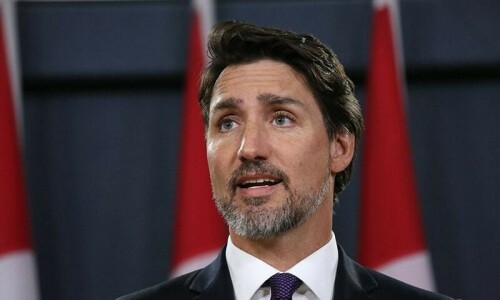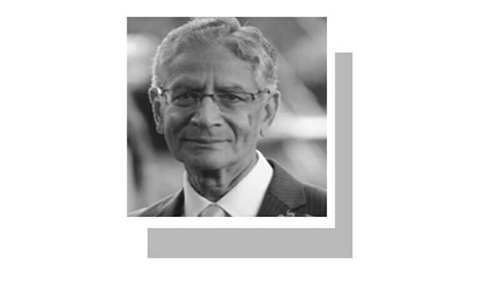Taliban Deputy Prime Minister for Political Affairs Maulvi Abdul Kabir has said that the Afghan soil will not pose a threat to any country, it emerged on Wednesday.
He passed these remarks during a meeting with Maulana Hamidul Haq — the chief of Jamiat Ulema-i-Islam-Sami (JUI-S) — in Kabul, according to Maulvi Kabir’s office.
The JUI-S leader led a delegation of Pakistani religious scholars on a five-day visit to Afghanistan. Haq, son of Maulana Sami-ul-Haq, is the deputy head of Darul Uloom Haqqania in Akora Khattak, where several Afghan Taliban leaders have studied.
JUI-S leader Israr Madni, who was a member of the delegation and heads the International Research Council for Religious Affairs, said the visit to the neighbouring country concluded today. He added that the visit was part of “religious diplomacy” which was welcomed by the Afghan side.
During the meeting with the Pakistani delegation, Maulvi Kabir termed the role of scholars in improving relations between the two countries as “very important”, a statement issued by his office said.
“Complete peace has been established in Afghanistan and no one is permitted to carry out subversive activities,” it quoted the Afghan deputy prime minister as telling the Pakistani delegation.
“Islamic Emirate wants good relations with all neighbours and does not allow anyone to pose a threat to any country from Afghan soil,” he added.
Separately, JUI-S chief Hamidul Haq told Dawn.com that visits by religious scholars to Afghanistan helped remove the mistrust between the neighbouring countries.
“We told Afghan leaders that these visits will resolve difficulties in bilateral relations,” the JUI-S leader said, adding that his delegation invited Afghan officials and scholars to visit Pakistan.
Meanwhile, the Afghan government’s statement quoted Haq as saying that he was happy at the establishment of the Islamic system in Kabul.
“Pakistani religious scholars and people want cordial relations between the two countries,” he said and expressed hope that political and economic relations between Pakistan and Afghanistan will be further expanded.
The JUI-S leader further condemned the freezing of Afghanistan assets and said that such “unilateral and cruel acts harm Afghans”.
He said JUI-S leaders held interactive sessions with Afghan Interior Minister Sirajuddin Haqqani, Minister Religious Affairs Moulana Noor Muhammad Saqib, former higher education minister Moulana Abdul Baqi Haqqani, Pakistan charge d’ affaires Ubaidur Rehman Nizamani, and others senior officials of the Afghan foreign ministry.
During the five-day visit, the delegation also travelled to Afghanistan’s Paktia, Logar, Khost provinces and other areas.
The visit comes at a time when relations between Pakistan and Afghanistan have suffered due to a spike in terrorist attacks, mostly claimed by the outlawed Tehreek-i-Taliban (TTP).
Islamabad has stated that the TTP and other groups use Afghan soil against Pakistan. While the Afghan Taliban have denied the charge, authorities remain unconvinced and have demanded action against the TTP, its sanctuaries, and the handover of its leaders.
The ties between the two neighbours took a further hit when Pakistan started deporting illegal Afghans. Nearly half a million undocumented Afghans have so far left Pakistan since November 1, last year.
‘Softening differences’
Commenting on the meeting, Pakistan’s former ambassador to Afghanistan Mansoor Ahmad Khan said that the Pakistani delegation’s visit to the neighbouring country was important for addressing the stumbling issues in the ties between Islamabad and Kabul.
“Hopefully this visit as part of ongoing Ulema diplomacy will help in softening the differences between the two sides on a common approach for dealing with the challenge posed by TTP’s [Tehreek-i-Taliban Pakistan] cross-border terrorism in Pakistan from their hideouts in Afghanistan,” he told Dawn.com.
“If the visit yields constructive interaction, one would expect it can pave the way for restarting the institutional dialogue between the two countries on a comprehensive agenda including security, trade and movement of people,” he said.
Mansoor further stated that it was important that the two sides work out a way of not making hostile comments about each other as seen in the recent past.
In January, Jamiat Ulema-i-Islam Fazl (JUI-F) chief Maulana Fazlur Rehman visited Afghanistan and also held talks with the Taliban supreme leader Sheikh Hibatullah Akhundzada in Kandahar.
















































